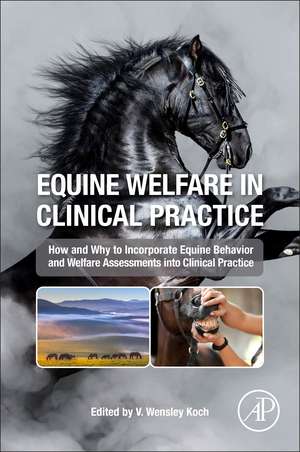Equine Welfare in Clinical Practice
Editat de Virginia Wensley Kochen Limba Engleză Paperback – 30 aug 2024
The book’s topics are addressed by internationally recognized experts and are most important for those whose formal veterinary education neglected to cover animal psychology, behavior modifi cation, and animal welfare, but they also provide current information and useful practical tips for those already familiar with equine behavior/welfare science. Topics include practical welfare assessment; how horses learn (both good and bad habits); safe, appropriate, and fear-free training and handling techniques for both adult horses and foals; how equine behavior is affected by diet (and the microbiome), by the differences between horse and human senses and cognition, and by enrichment; differentiating medical from behavioral problems; and preventing and treating behavioral problems (including stereotypies). It describes the Equine Behavior Assessment and Research Questionnaire (E-BARQ), a tool that can assist veterinarians to introduce behavior into their practices in a simple and basic manner, and it offers guidance on resolving ethical dilemmas while advancing equine welfare. The final chapter offers resources for further study and access to specialists for consultation or referral. Ultimately, the book will serve its purpose if it helps improve the lives of horses, their owners, and their veterinarians.
- Emphasizes the clinical applications of the sciences of equine behavior and welfare
- Offers expert recommendations to improve the lives of horses, their owners, and the veterinarians who care for them
- Provides resources for further study and access to specialists for consultation or referral
Preț: 669.92 lei
Preț vechi: 877.33 lei
-24% Nou
Puncte Express: 1005
Preț estimativ în valută:
128.20€ • 133.68$ • 106.55£
128.20€ • 133.68$ • 106.55£
Carte tipărită la comandă
Livrare economică 14-28 martie
Preluare comenzi: 021 569.72.76
Specificații
ISBN-13: 9780323995085
ISBN-10: 032399508X
Pagini: 290
Dimensiuni: 216 x 276 x 19 mm
Greutate: 0.45 kg
Editura: ELSEVIER SCIENCE
ISBN-10: 032399508X
Pagini: 290
Dimensiuni: 216 x 276 x 19 mm
Greutate: 0.45 kg
Editura: ELSEVIER SCIENCE
Cuprins
Foreward
Natalie Waran
Acknowledgements
V. Wensley Koch
Introduction
V. Wensley Koch
1. Assessing Equine Welfare: Operationalizing the Five Domains Model for Veterinary Practitioners
Katherine Littlewood, Ngaio J. Beausoleil and David Mellor
2. Principles of Learning for Equine Clinicians
Robin L. Foster
3. Minimizing Fear Associated with Veterinary Procedures
Stacie Boswell
4. Raising Well-trained and Sustainable Foals
Hayley Randle
5. Training and Behavior Modification for Veterinarians: The Good, the Bad, and the Ugly
Orla Doherty
6. Diet and Behavior, Including the Effects of the Gut Microbiome
Katherine A. Houpt
7. How Horses Perceive Their World - What Can Practitioners Share with Their Clients to Enhance Safety & Welfare?
Maria Vilain Rørvang and Camie Heleski
8. Between the Horse's Ears: Equine Cognition, Implications for Welfare, and Why It Matters for Equine Practitioners
Antonia J.Z. Henderson
9. Environmental Enrichment
Andrea D. Ellis and Carol Hall
10. Distinguishing Physical vs Psychological Causes of Behavior and Performance Problems
Sue McDonnell
11. Prevention and Treatment of Horse Behavior Problems and ‘Vices’, Including Stereotypic Behavior
Daniel S. Mills, Claire Ricci-Bonot and Milly Jones
12. The Equine Behavior Assessment and Research Questionnaire (E-BARQ): How Citizen Science Can Enhance Veterinary Practice
Kate Fenner
13. Veterinary Ethics and Equine Welfare: Principalism, a Five Cs Approach, and Ethical Decision Making in Support of the Duties to Care and Guide
Raymond Anthony
14. Finding Help
Orla Doherty, V. Wensley Koch and Sue McDonnell
Natalie Waran
Acknowledgements
V. Wensley Koch
Introduction
V. Wensley Koch
1. Assessing Equine Welfare: Operationalizing the Five Domains Model for Veterinary Practitioners
Katherine Littlewood, Ngaio J. Beausoleil and David Mellor
2. Principles of Learning for Equine Clinicians
Robin L. Foster
3. Minimizing Fear Associated with Veterinary Procedures
Stacie Boswell
4. Raising Well-trained and Sustainable Foals
Hayley Randle
5. Training and Behavior Modification for Veterinarians: The Good, the Bad, and the Ugly
Orla Doherty
6. Diet and Behavior, Including the Effects of the Gut Microbiome
Katherine A. Houpt
7. How Horses Perceive Their World - What Can Practitioners Share with Their Clients to Enhance Safety & Welfare?
Maria Vilain Rørvang and Camie Heleski
8. Between the Horse's Ears: Equine Cognition, Implications for Welfare, and Why It Matters for Equine Practitioners
Antonia J.Z. Henderson
9. Environmental Enrichment
Andrea D. Ellis and Carol Hall
10. Distinguishing Physical vs Psychological Causes of Behavior and Performance Problems
Sue McDonnell
11. Prevention and Treatment of Horse Behavior Problems and ‘Vices’, Including Stereotypic Behavior
Daniel S. Mills, Claire Ricci-Bonot and Milly Jones
12. The Equine Behavior Assessment and Research Questionnaire (E-BARQ): How Citizen Science Can Enhance Veterinary Practice
Kate Fenner
13. Veterinary Ethics and Equine Welfare: Principalism, a Five Cs Approach, and Ethical Decision Making in Support of the Duties to Care and Guide
Raymond Anthony
14. Finding Help
Orla Doherty, V. Wensley Koch and Sue McDonnell
